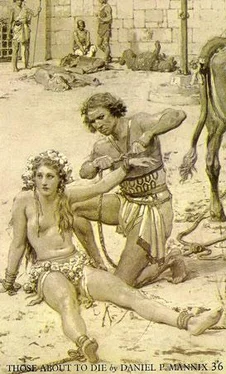Daniel Mannix - Those About to Die
Здесь есть возможность читать онлайн «Daniel Mannix - Those About to Die» весь текст электронной книги совершенно бесплатно (целиком полную версию без сокращений). В некоторых случаях можно слушать аудио, скачать через торрент в формате fb2 и присутствует краткое содержание. Год выпуска: 1972, ISBN: 1972, Издательство: Mayflower Books Ltd, Жанр: Исторические приключения, на английском языке. Описание произведения, (предисловие) а так же отзывы посетителей доступны на портале библиотеки ЛибКат.
- Название:Those About to Die
- Автор:
- Издательство:Mayflower Books Ltd
- Жанр:
- Год:1972
- ISBN:978-0583121347
- Рейтинг книги:4 / 5. Голосов: 1
-
Избранное:Добавить в избранное
- Отзывы:
-
Ваша оценка:
- 80
- 1
- 2
- 3
- 4
- 5
Those About to Die: краткое содержание, описание и аннотация
Предлагаем к чтению аннотацию, описание, краткое содержание или предисловие (зависит от того, что написал сам автор книги «Those About to Die»). Если вы не нашли необходимую информацию о книге — напишите в комментариях, мы постараемся отыскать её.
Those About to Die — читать онлайн бесплатно полную книгу (весь текст) целиком
Ниже представлен текст книги, разбитый по страницам. Система сохранения места последней прочитанной страницы, позволяет с удобством читать онлайн бесплатно книгу «Those About to Die», без необходимости каждый раз заново искать на чём Вы остановились. Поставьте закладку, и сможете в любой момент перейти на страницу, на которой закончили чтение.
Интервал:
Закладка:
Flamma, then, had been given a bawling-out by a young officer, fresh out of military school and he told the officer off. The officer struck him with a cane and Flamma knocked him down. For this offence, he was sentenced to the arena.
Flamma hoped to be matched against some other ex-soldier and fight with regulation sword and shield, which he knew how to handle, but the penalty for striking an officer was death and the high brass was determined that Flamma wouldn't leave the arena alive. So he was put into one of the new "novelty acts" which were springing up. The Roman mob had tired of the standard combats so the promoters invented fights between a Retiarius, who wore no armour but carried a net and a trident (a three-pronged spear), and a Sccutor, who was equipped as a Gaul; that is^ he had a fish insignia on his helmet as did the Gauls, and carried a sword and shield. He wore a breastplate, and his right arm and left leg were protected by armour. His left arm and right leg were bare to give him greater freedom of movement. Except for its fish symbol, the helmet was very plain so as not to offer a spot where the Retiarius' net or trident could catch. Flamma was to play the part of the Secutor or "chaser." It was up to him to catch the nimble Retiarius or "netman."
The edges of the Retiarius' net were fringed with small lead weights, so when the net was thrown it would open to form a circle. Similar nets are still used by fishermen in various parts of the world today. If he could suceed in catching the Secutor in his net, the Retiarius could pull the heavily armed man off balance and dispatch him with the trident. The Retiarius always had the advantage in these fights and, even with well-trained gladiators, the betting was generally five to three on the netman. In this case, Flamma knew nothing about the business, while the Retiarius was an expert. The odds on the Retiarius were fifty to one with no takers.
When Flamma appeared in the arena in his Gaul's outfit, he was greeted by boos and catcalls from the mob. They knew he was a mutineer, and also he was nothing but a palooka who couldn't be expected to put up an interesting fight. Flamma was a fairly simple fellow and his spirit had been broken by the court-martial and the sentence. When he saw that everyone was against him, he dropped his sword and sat down to let the Retiarius finish him off. The crowd, feeling that they had been swindled, burst into shouts of "Chicken!" "What's he afraid of?" "Why does he die so sulkily?" "Whip him!" "Burn him!"—for a gladiator who refused to fight was whipped and prodded with hot irons until he changed his mind. But Flamma's whole regiment had turned out for the fight and they stood up in the stands, shouting for him. When Flamma heard their familiar voices, he picked up his sword and cried, "All right, boys, I'll do my best for the honour of the regiment!" The Retiarius had been parading the arena, taking bows and making dates with the pretty girls for after the fight. Now he settled his net and came for the soldier.
As he approached Flamma, the Retiarius sang the traditional chant of his profession: "I seek not you, I seek a fish. Why do you flee from me, O Gaul?" meanwhile making tentative casts with his net. Then he pretended to slip and fall, hoping to get Flamma off balance. When that didn't work, he danced around the heavily armoured man, calling him a coward and daring him to come on, but Flamma had too much sense to wear himself out chasing the agile Retiarius around the arena. He stood his ground and made the other man come to him.
The Retiarius circled him, holding the net by one end and slinging it at Flamma's feet, hoping to have the long net wrap around the Secutor's legs and trip him. Then he suddenly changed his technique and threw the net in a cast. Flamma turned it with his shield, but one of the lead pellets hit him in the left eye, partially blinding him. The Retiarius saw his chance and, rushing in, knocked the sword out of the soldier's hand with his trident. Both men ran for the sword but the light Retiarius got there first and threw the sword into the stands. Then he turned to finish off the unarmed man.
It seemed as though Flamma was through, but the Retiarius made the mistake of first showing off with some fancy net casts. Flamma managed to give the trident a kick that sent it flying across the arena. The terrified Retiarius turned to run after it, but before he could get away, Flamma grabbed him by the tunic. As the Retiarius went down on his knees, Flamma gave him a rabbit punch with the edge of the shield and killed him.
The victory, although totally unexpected, didn't seem to help Flamma. The emperor simply signalled for another Retiarius to come out and finish him off. But here the condemned man got a break. Flamma's nickname around the barracks was "loach," as loaches have whiskers like a catfish and Flamma had a bristling beard. The soldiers in the stands had been yelling: "Go it, loach!" and the crowd had taken up the yell after Flamma showed that he was really willing to fight. Now a "loach" had killed a "fisherman" and the crowd thought this was such a joke that they demanded that Flamma be spared. Very few emperors dared to ignore the will of the people in the circus. Often notorious bandits and murderers were saved in this way, to the indignation of the judges. So Flamma was sent to gladiatorial school to learn his new trade.
There were four big gladiatorial schools in Italy at this time (about 10 a.d. under Augustus Caesar). They were known as The Great School, The Gallic, The Dacian and the School for Bestiarii (animal fighters). Later, there were dozens of schools maintained by rich enthusiasts of the fights just as today rich men have racing stables. Flamma was sent to The Great School in Rome. No vestige of this school remains but the gladiatorial school in Pompeii is still in good condition, so I'll describe that, although The Great School must have been much bigger.
The school was a rectangular building some 170 feet by 140 feet with an open court in the middle where the men could practice. Around the court ran a roofed passage with small rooms opening into it rather like a cloister. The rooms were only ten by twelve feet, but each man had his cell where he could be alone. There was a kitchen, a hospital, an armoury, quarters for the trainers and the guards, and even a graveyard. There was also a prison with leg irons, shackles, branding irons and whips. Opening into the prison was a room used for solitary confinement with a ceiling so low a man couldn't sit up and so short he couldn't stretch out his legs. The remains of four gladiators were found in the Pompeian prison—the men had been unable to escape when the city was covered with the lava flow from Mount Vesuvius. The school was owned by a big promoter but was actually run by an old ex-gladiator who knew all the tricks. These trainers were called lanistae.
Every precaution was taken to keep the gladiators well guarded. The Romans never forgot the lesson they had learned in 72 b.c. when a gladiator named Spartacus with seventy of his comrades escaped from the school and took refuge in the crater of Mount Vesuvius. As all these men were professional fighters, getting them out of the crater was quite a problem. They were joined by escaped slaves, robber bands and discontented peasants. Under Spartacus' leadership, this band of outlaws defeated two Roman generals and seized all southern Italy. They nearly captured Rome itself before being wiped out by legions hastily recalled from the frontiers.
Flamma first had to take an oath: "To suffer myself to be whipped with rods, burned with fire, or killed with steel if I disobey." Then he was given a cell whose previous occupant had been killed in the last games.
Читать дальшеИнтервал:
Закладка:
Похожие книги на «Those About to Die»
Представляем Вашему вниманию похожие книги на «Those About to Die» списком для выбора. Мы отобрали схожую по названию и смыслу литературу в надежде предоставить читателям больше вариантов отыскать новые, интересные, ещё непрочитанные произведения.
Обсуждение, отзывы о книге «Those About to Die» и просто собственные мнения читателей. Оставьте ваши комментарии, напишите, что Вы думаете о произведении, его смысле или главных героях. Укажите что конкретно понравилось, а что нет, и почему Вы так считаете.












